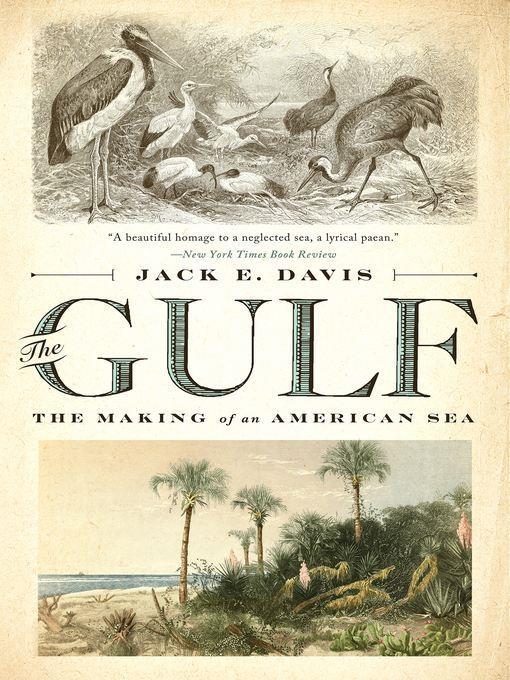
The Gulf
The Making of An American Sea
کتاب های مرتبط
- اطلاعات
- نقد و بررسی
- دیدگاه کاربران
نقد و بررسی

Starred review from January 23, 2017
In this comprehensive and thoroughly researched narrative, Davis, professor of history and sustainability at the University of Florida, positions the Gulf of Mexico as an integral part of American ecology, culture, and—with future good stewardship—economic success. He sprinkles geological and marine history throughout the chronicle of the coast’s demographic changes from indigenous inhabitants to European colonizers, Louisiana Cajuns, Texas roughnecks, and Florida’s tourists. Davis unflinchingly addresses the decades of oil spills, overfishing, and poor environmental practices that reduced resources. He also describes the decline of coastal marshes, which protect against hurricanes, and the erosion stemming from ill-conceived Army Corps of Engineer projects. Hurricanes Camille and Katrina and the catastrophic BP Deepwater Horizon oil spill poignantly receive their due. Davis also discusses inspired conservation efforts to combat the fashion industry’s feather fascination and subsequent decimation of snowy egrets. The density of the fact-packed chapters calls for a deliberate reading pace so as not to overlook any of Davis’s thought-provoking commentary and keen descriptions. Rather than advocate an impractical hands-off approach to dealing with the Gulf’s myriad issues, Davis makes the convincing argument that wiser, far-sighted practices—including those aimed at combating climate change—could help the Gulf region to remain a bastion of resources for the foreseeable future.

Starred review from February 1, 2017
A sweeping environmental history of the Gulf of Mexico that duly considers the ravages of nature and man.In light of the 2010 devastation of the BP oil spill, environmental historian Davis (History and Sustainability Studies/Univ. of Florida; An Everglades Providence: Marjory Stoneman Douglas and the American Environmental Century, 2009, etc.) presents an engaging, truly relevant new study of the Gulf as a powerful agent in the American story, one that has become "lost in the pages of American history." Once the habitat of the highly developed, self-sustaining Calusa indigenous people, the rich estuary of the Gulf is the 10th largest body of water in the world, and it forms the sheltered basin that creates the warm, powerful Gulf Stream, which allowed the first explorers, such as Ponce de Leon, to make their ways back to the Old World. Davis meanders through the early history of this fascinating sea, which became a kind of graveyard to many early marooned explorers due to shipwrecks and run-ins with natives. Yet the conquistadors took little note of the abundant marine life inhabiting the waters and, unaccountably, starved. A more familiar economy was established at the delta of the muddy, sediment-rich Mississippi River, discovered by the French. The author focuses on the 19th century as the era when the Gulf finally asserted its place in the great move toward Manifest Destiny; it would "significantly enlarge the water communication of national commerce and shift the boundary of the country from vulnerable land to protective sea." The Gulf states would also become a mecca of tourism and fishing and, with the discovery of oil, enter a dire period of the "commercialization of national endowments." The story of this magnificent body of water and its wildlife grows tragic at this point--e.g., the "killing juggernaut" of Gulf wading birds to obtain fashionable feathers. Still, it remains an improbable, valiant survival tale in the face of the BP oil spill and ongoing climate change. An elegant narrative braced by a fierce, sobering environmental conviction.
COPYRIGHT(2017) Kirkus Reviews, ALL RIGHTS RESERVED.

Starred review from January 1, 2017
"If Jefferson's West was the land of the nation's manifest destiny, the Gulf was its sea." So argues Davis (history, Univ. of Florida; An Everglades Providence) in this magnificent chronicle of the Gulf of Mexico. Spanning a period from the gulf's geological formation to the present, this book is organized around the "natural characteristics of the Gulf" (i.e., its fauna, flora, weather, and landscape). The stories of the Europeans--the Spanish, who found the gulf; the French, who discovered its connection to the Mississippi; and the British, who began to map it--will be familiar to many readers, but Davis's retelling still sticks. The core of the title, though, concerns "America's Gulf" in the 19th century onward: when the Coastal Survey finished charting the coast; when the area's first real industry, commercial fishing, flourished; when sport fishing and beach tourism became popular; and when the petroleum industry took off. Environmental perturbations followed. And lost, like artifacts in the Florida aboriginal Calusa's shell mounds, was the lesson of holding a "prudent relationship with nature." VERDICT This is a work of astonishing breadth: richly peopled, finely structured, beautifully written. It should appeal equally well to Gulf coast residents and snowbirds, students of environmental history, and general readers.--Robert Eagan, Windsor P.L., Ont.
Copyright 2017 Library Journal, LLC Used with permission.

























دیدگاه کاربران